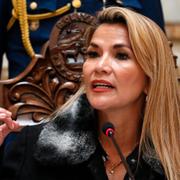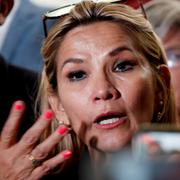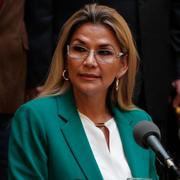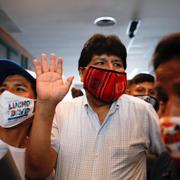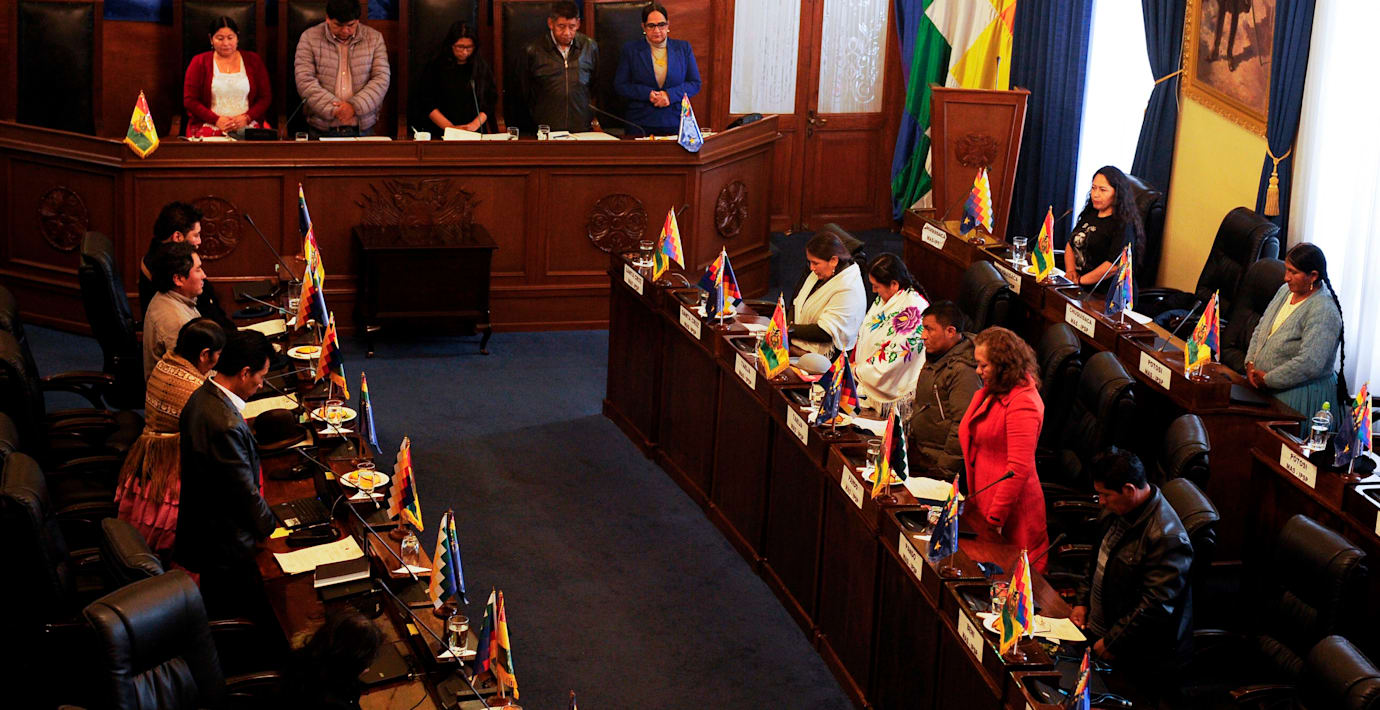
Bolivias senat säger ja till förslag om ny vallag
Den bolivianska senaten röstade i kväll ja till en lag som möjliggör nyval i landet, skriver AFP.
Förslaget innebär att presidenter får sitta i max två mandatperioder, vilket skulle innebära att den nyligen avsatte Evo Morales inte får möjlighet att delta.
Innan förslaget blir verklighet måste det röstas igenom i underhuset och sedan signeras av interimspresidenten Jeanine Áñez.
bakgrund
Evo Morales
Wikipedia (en)
Juan Evo Morales Ayma (Spanish pronunciation: [ˈeβo moˈɾales]; born October 26, 1959) is a Bolivian politician and former cocalero activist who served as the President of Bolivia from 2006 to 2019. Widely regarded as the country's first president to come from the indigenous population, his administration focused on the implementation of leftist policies, poverty reduction, and combating the influence of the United States and multinational corporations in Bolivia. A socialist, he is the head of the Movement for Socialism (MAS) party.
Born to an Aymara family of subsistence farmers in Isallawi, Orinoca Canton, Morales undertook a basic education before mandatory military service, in 1978 moving to Chapare Province. Growing coca and becoming a trade unionist, he rose to prominence in the campesino ("rural laborers") union. In that capacity, he campaigned against U.S. and Bolivian attempts to eradicate coca as part of the War on Drugs, denouncing these as an imperialist violation of indigenous Andean culture. His involvement in anti-government direct action protests resulted in multiple arrests. Morales entered electoral politics in 1995, became the leader of the MAS, and was elected to Congress in 1997. Coupled with populist rhetoric, his campaign focused on issues affecting indigenous and poor communities, advocating land reform, and the redistribution of gas wealth. He gained increased visibility through the Cochabamba protests and gas conflict. In 2002, he was expelled from Congress for encouraging anti-government protesters, although he came second in that year's presidential election.
Once elected in 2005, Morales increased taxation on the hydrocarbon industry to bolster social spending and emphasized projects to combat illiteracy, poverty, racism, and sexism. Vocally criticizing neoliberalism and reducing Bolivia's dependence on the World Bank and International Monetary Fund, his administration oversaw strong economic growth while following a policy termed "Evonomics" which sought to move from a liberal economic approach to a mixed economy. Scaling back U.S. influence in the country, he built relationships with leftist governments in the Latin American pink tide and signed Bolivia into the Bolivarian Alliance for the Americas. Attempting to moderate the left-indigenous activist community, his administration also opposed the right-wing autonomist demands of Bolivia's eastern provinces. Winning a recall referendum in 2008, he instituted a new constitution that established Bolivia as a plurinational state and was re-elected in 2009. His second term witnessed the continuation of leftist policies and Bolivia's joining of the Bank of the South and Community of Latin American and Caribbean States; he was again reelected in the 2014 general election. Following the disputed 2019 general election and the ensuing unrest, Morales agreed to military calls for his resignation. He was then granted political asylum in Mexico.
Morales has been praised for significantly reducing poverty and illiteracy in Bolivia and has been internationally decorated with various awards. His supporters have lauded him as a champion of indigenous rights, anti-imperialism, and environmentalism. Alternately, a number of leftist, indigenous, and environmentalist critics have accused him of failing to live up to many of his espoused values, and opponents have accused him of being excessively radical and authoritarian and have claimed that his defence of coca contributes to illegal cocaine production.
Bolivia
Omni är politiskt obundna och oberoende. Vi strävar efter att ge fler perspektiv på nyheterna. Har du frågor eller synpunkter kring vår rapportering? Kontakta redaktionen
